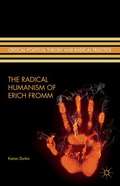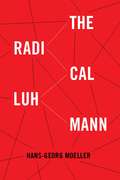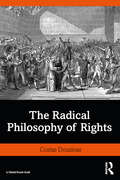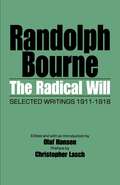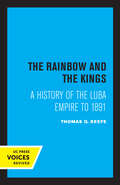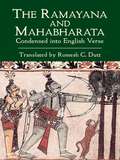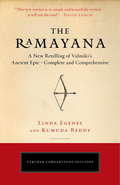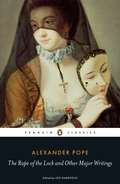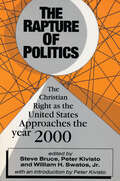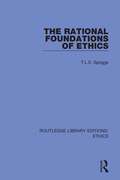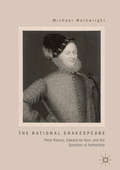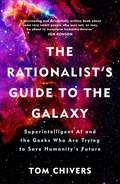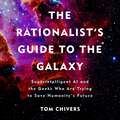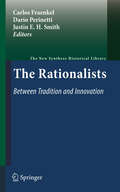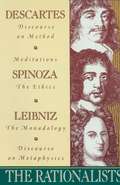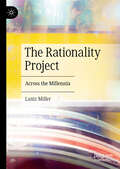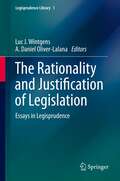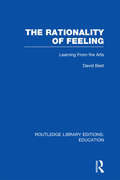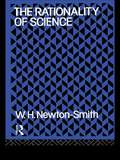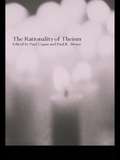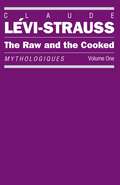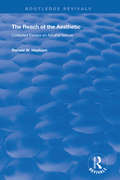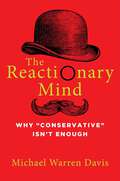- Table View
- List View
The Radical Humanism of Erich Fromm
by Kieran DurkinThis book argues that Fromm is a vital and largely overlooked contribution to twentieth-century intellectual history, and one who offers a refreshingly reconfigured form of humanism that is capable of reintegrating explicitly humanist analytical categories and schemas back into social theoretical (and scientific) considerations.
The Radical Luhmann
by Hans-Georg MoellerNiklas Luhmann (1927-1998) was a German sociologist and system theorist who wrote on law, economics, politics, art, religion, ecology, mass media, and love. Luhmann advocated a radical constructivism and antihumanism, or "grand theory," to explain society within a universal theoretical framework. Nevertheless, despite being an iconoclast, Luhmann is viewed as a political conservative. Hans-Georg Moeller challenges this legacy, repositioning Luhmann as an explosive thinker critical of Western humanism.Moeller focuses on Luhmann's shift from philosophy to theory, which introduced new perspectives on the contemporary world. For centuries, the task of philosophy meant transforming contingency into necessity, in the sense that philosophy enabled an understanding of the necessity of everything that appeared contingent. Luhmann pursued the opposite—the transformation of necessity into contingency. Boldly breaking with the heritage of Western thought, Luhmann denied the central role of humans in social theory, particularly the possibility of autonomous agency. In this way, after Copernicus's cosmological, Darwin's biological, and Freud's psychological deconstructions of anthropocentrism, he added a sociological "fourth insult" to human vanity.A theoretical shift toward complex system-environment relations helped Luhmann "accidentally" solve one of Western philosophy's primary problems: mind-body dualism. By pulling communication into the mix, Luhmann rendered the Platonic dualist heritage obsolete. Moeller's clarity opens such formulations to general understanding and directly relates Luhmannian theory to contemporary social issues. He also captures for the first time a Luhmannian attitude toward society and life, defined through the cultivation of modesty, irony, and equanimity.
The Radical Philosophy of Rights
by Costas DouzinasAfter 1989 human rights have expanded into a vernacular touching every aspect of social life. They are seen as the key concept in morals and politics and a main tool for forging individual and collective identities. They are the ideology after ‘the end of ideologies’ – the only values left after ‘the end of history’. The response of the left to the rights revolution has been muted and unsure. Classical Marxist critiques of (natural) rights have made the left justly suspicious, and this is still the case today. Elaborating and addressing a series of foundational paradoxes of rights, this book – the third in Costas Douzinas’s human rights trilogy, following The End of Human Rights and Human Rights and Empire – provides a long-overdue re-evaluation of the history and political uses of rights for the left. The book examines the history and philosophy of the (legal) person, the subject, the human and dignity from classical Rome to postmodern Brussels. It traces the gradual abandonment of right, virtue and the common good for individual rights and self-interest. The limited and distorted conception of rights of liberal jurisprudence is contrasted with an alternative that sees rights as a relation involved in the struggle for recognition and an everyday utopia. The right to resistance and revolution, prohibited but regularly returning like the repressed, rescues law from sclerosis and presents a case study of the paradoxical nature of rights. Finally, the book offers a brief examination of law’s encounter with radical politics informed by the author’s strange experience as an ‘accidental’ politician in the first radical left government in Europe. The book’s radical concept of legal philosophy and public law will be of considerable value to legal theorists, political philosophers and anyone with an interest in thinking and acting in ways that go beyond the limits of liberal, and neoliberal, ideology.
The Radical Will: Selected Writings 1911-1918
by Randolph BourneRandolph Bourne was only thirty-two when he died in 1918, but he left a legacy of astonishingly mature and incisive writings on politics, literature, and culture, which were of enormous influence in shaping the American intellectual climate of the 1920s and 1930s. This definitive collection, back in print at last, includes such noted essays as "The War and the Intellectuals," "The Fragment of the State," "The Development of Public Opinion," and "John Dewey's Philosophy." Bourne's critique of militarism and advocacy of cultural pluralism are enduring contributions to social and political thought, sure to have an equally strong impact in our own time. In their introduction and preface, Olaf Hansen and Christopher Lasch provide biographical and historical context for Bourne's work.
The Rainbow and the Kings: A History of the Luba Empire to 1891
by Thomas Q. ReefeThis title is part of UC Press's Voices Revived program, which commemorates University of California Press’s mission to seek out and cultivate the brightest minds and give them voice, reach, and impact. Drawing on a backlist dating to 1893, Voices Revived makes high-quality, peer-reviewed scholarship accessible once again using print-on-demand technology. This title was originally published in 1981.
The Ramayana and Mahabharata: Condensed into English Verse
by Romesh C. DuttLike ancient Greece, India claims two great epics: the Ramayana, recounting the adventures of a banished prince who wanders for years in the wilderness of southern India, bears a resemblance to the Odyssey; the Mahabharata, based on the legends surrounding a war in which all the warlike races of Northern India took part, is the country's Iliad. Together, the two represent the epic literature of the ancient Hindus, offering latter-day readers the most realistic image of the civilization and culture of India 3,000 years ago — its political and social life as well as its religion and philosophy.The Ramayana portrays domestic and religious life, with vignettes of tenderness, endurance, and devotion. The Mahabharata depicts the political climate of ancient India, with tales of valor and heroism, ambition, and chivalry. This condensed version of these extremely long tales features selection from cantos that convey the leading incidents of the epic, linking them with short notes. Readers seeking a practical knowledge of these magnificent works within a reasonable compass can do no better than this convenient and poetic translation.
The Ramayana: A New Retelling of Valmiki's Ancient Epic--Complete and Comprehensive
by Kumuda Reddy Linda EgenesA delightfully straightforward and lyrical retelling of the ancient Indian epic of loyalty, betrayal, redemption, and insight into the true nature of life -- one of history's most sacred ethical works, rendered with completeness and sterling accuracy for the modern reader.Here is one of the world's most hallowed works of sacred literature, the grand, sweeping epic of the divine bowman and warrior Rama and his struggles with evil, power, duplicity, and avarice. The Ramayana is one of the foundations of world literature and one of humanity's most ancient and treasured ethical and spiritual works. Includes an introduction by scholar Michael Sternfeld. From the Trade Paperback edition.
The Ransom of the Soul: Afterlife and Wealth in Early Western Christianity
by Peter BrownMarking a departure in our understanding of Christian views of the afterlife from 250 to 650 CE, The Ransom of the Soul explores a revolutionary shift in thinking about the fate of the soul that occurred around the time of Rome’s fall. Peter Brown describes how this shift transformed the Church’s institutional relationship to money and set the stage for its domination of medieval society in the West.<P><P> Early Christian doctrine held that the living and the dead, as equally sinful beings, needed each other in order to achieve redemption. The devotional intercessions of the living could tip the balance between heaven and hell for the deceased. In the third century, money began to play a decisive role in these practices, as wealthy Christians took ever more elaborate steps to protect their own souls and the souls of their loved ones in the afterlife. They secured privileged burial sites and made lavish donations to churches. By the seventh century, Europe was dotted with richly endowed monasteries and funerary chapels displaying in marble splendor the Christian devotion of the wealthy dead.
The Rape of the Lock and Other Major Writings
by Alexander PopeAlexander Pope (1688-1744) was the greatest English poet of his age, whose acerbic insights into human nature have entered the language, and whose verse still astonishes with its energy and inventiveness centuries after his death. This new selection of Pope's work follows the path of his poetic genius over his lifetime. It contains early poems including the masterly mock-epic 'The Rape of the Lock', which satirizes a notorious society scandal through glorious heroic couplets, the brilliantly aphoristic 'An Essay on Criticism' and excerpts from his translation of the Iliad. Later poems represented include Pope's ironic adaptations of Horace's Epistles, Satires and Odes, and the remarkable 'Dunciad', a stinging attack on his literary rivals and the mediocrity of Grub Street hacks. Here too are selected prose works and letters from Pope to his contemporaries such as John Gay and Jonathan Swift.
The Rapture of Politics: Christian Right as the United States Approaches the Year 2000
by Steve BruceTheologically conservative Protestants have entered the political arena with an agenda that is at once political and religious. Assessing the current impact of this New Christian Right (NCR) on American politics, the contributors to this new book present provocative and diverse perspectives on a phenomenon that has, despite its pervasiveness in American culture, been too little examined. While some contributors show a disdain for the NCR, others evince genuine sympathy for the movement. Steve Bruce takes aim at sociologists of religion who, in his estimation, have exaggerated the strength of the NCR. Clyde Wilcox believes the NCR attracts only a limited electoral following, and will have little success at the state and national levels. Stephen Johnson reports on voting patterns of Catholics, mainline Protestants, and conservative Protestants in Muncie, Indiana. And Phillip Hammond and his associates observe that the main fault line between conservatives and liberals is now over “family values.” John Simpson singles out debates over abortion and homosexuality as the most potent cultural divisions arising out of the 1980s. Lyman A. Kellstedt and colleagues mark the 1992 presidential election as a watershed event, beginning a dramatic new cleavage in the two-party system. James M. Penning and Matthew C. Moen address issues related to NCR organizations and their place in the political arena. It is clear that the NCR will remain a part of the religious and political landscape lor some time, though there is little consensus over where the NCR will be located in that landscape. The Rapture of Politics will be of interest to political scientists, theologians, sociologists, and scholars of American culture.
The Rational Foundations of Ethics
by T. L. SpriggeOriginally published in 1988, this landmark study develops its own positive account of the nature and foundations of moral judgement, while at the same time serving as a guide to the range of views on the matter which have been given in modern western philosophy. The book addresses itself to two main questions: Can moral judgements be true or false in that fundamental sense in which a true proposition is one which describes things as they really are? Are rational methods available in ethics which can be expected to produce convergence on shared moral views on the part of those who use them intelligently?
The Rational Shakespeare: Peter Ramus, Edward de Vere, and the Question of Authorship
by Michael WainwrightThe Rational Shakespeare: Peter Ramus, Edward de Vere, and the Question of Authorship examines William Shakespeare’s rationality from a Ramist perspective, linking that examination to the leading intellectuals of late humanism, and extending those links to the life of Edward de Vere, Seventeenth Earl of Oxford. The application to Shakespeare’s plays and sonnets of a game-theoretic hermeneutic, an interpretive approach that Ramism suggests but ultimately evades, strengthens these connections in further supporting the Oxfordian answer to the question of Shakespearean authorship.
The Rationalist's Guide to the Galaxy: Superintelligent AI and the Geeks Who Are Trying to Save Humanity's Future
by Tom Chivers'A fascinating and delightfully written book about some very smart people who may not, or may, be about to transform humanity forever' JON RONSON'Beautifully written, and with wonderful humour, this is a thrilling adventure story of our own future' LEWIS DARTNELL, author of THE KNOWLEDGE and ORIGINSAre paperclips going to destroy life as we know it?What can Mickey Mouse teach us about how to programme AI?Could a more rational approach to life be what saves us all?This is a book about about a community of people who are trying to think rationally about intelligence and what insight they can and can't give us about the future of the human race. It explains why these people are worried about an AI apocalypse, why they might be right, and why they might be wrong. It is a book about the cutting edge of our thinking on intelligence and rationality right now by the people who stay up all night worrying about it.
The Rationalist's Guide to the Galaxy: Superintelligent AI and the Geeks Who Are Trying to Save Humanity's Future
by Tom Chivers'A fascinating and delightfully written book about some very smart people who may not, or may, be about to transform humanity forever' JON RONSON'The AI does not hate you, nor does it love you, but you are made of atoms which it can use for something else'This is a book about AI and AI risk. But it's also more importantly about a community of people who are trying to think rationally about intelligence, and the places that these thoughts are taking them, and what insight they can and can't give us about the future of the human race over the next few years. It explains why these people are worried, why they might be right, and why they might be wrong.It isn't, on the other hand, a book about the future - it doesn't try to guess how many of us are going to be put out of work by AI, or what the operating system in your house might be able to do ten years hence. Instead, this is a book about the cutting edge of our thinking on intelligence and rationality right now by the people who stay up all night worrying about it.Along the way, we discover why we probably don't need to worry about a future AI resurrecting a perfect copy of our minds and torturing us for not inventing it sooner but we should be concerned about paperclips destroying life as we know it; how Mickey Mouse can teach us an important lesson about how to programme AI; and why Spock is not as logical as we think he is.(p) Orion Publishing Group Ltd 2019
The Rationalists: Between Tradition and Innovation
by Justin E. Smith Carlos Fraenkel Dario PerinettiThis volume draws a balanced picture of the Rationalists by bringing their intellectual contexts, sources and full range of interests into sharper focus, without neglecting their core commitment to the epistemological doctrine that earned them their traditional label. The collection of original essays addresses topics ranging from theodicy and early modern music theory to Spinoza's anti-humanism, often critically revising important aspects of the received picture of the Rationalists. Another important contribution of the volume is that it brings out aspects of Rationalist philosophers and their legacies that are not ordinarily associated with them, such as the project of a Cartesian ethics. Finally, a strong emphasis is placed on the connection of the Rationalists' philosophy to their interests in empirical science, to their engagement in the political life of their era, and to the religious background of many of their philosophical commitments.
The Rationalists: Descartes, Spinoza, Leibniz
by Rene Descartes Gottfried Wilhelm Leibniz Benedict De SpinozaFounded in the mid-17th century, Rationalism was philosophy's first step into the modern era. This volume contains the essential statements of Rationalism's three greatest figures: Descartes, who began it; Spinoza, who epitomized it; and Leibniz, who gave it its last serious expression.
The Rationality Project: Across the Millennia
by Lantz MillerRationality has been philosophers’ concern stretching back to ancient times. But just what is rationality? In trying to answer this question, rationality is found to be more complex than supposed. This book investigates this supposition and thereby aspires to bring together the facets of the peculiar phenomenon that is rationality. Rationality is shown to be both more complex than presumed and yet more accessible than many may have feared. One argument concedes the common assumption that those interested in rationality need only rely on intuitions about this phenomenon. Yet, even moderate research reveals the concept’s profound fuzziness. This book aims to set forth a theory, explanation, and unification of the kindred and disparate understandings of this elusive concept, rationality.
The Rationality and Justification of Legislation: Essays in Legisprudence
by Luc J. Wintgens A. Daniel Oliver-LalanaThe essays collected in this book address legislation from the viewpoint of legal theory and provide an overview of current research in legisprudence as a new scholarly approach to lawmaking. The overall focus of the volume is on the justification of legislation, with a special emphasis on the intricate notion of legislative rationality. With the rational justification of legislation as their central theme, the essays elaborate on the foundations and bounds of legislation and the search for a more principled lawmaking, discuss the role of legislation within the framework of democratic constitutionalism, analyze legislation as implementation of constitutional law, and explore how legislative argumentation in parliament can be construed as a source of justification of laws.
The Rationality of Feeling: Learning From the Arts (Routledge Library Editions: Education)
by David BestThis volume emphasizes the necessity for arts teachers to nurture the personal development of their students by expanding their artistic understanding and creativity. In aiming to provide a broader understanding for the effective teaching of the arts, the author provides powerful reasons for seeing the arts as agents of learning, understanding and development. The volume also demonstrates that whilst the arts are centrally concerned with feeling, they are as fully open to objective reasoning as any other subject discipline such as science, but the dichotomy between ‘scientism’ and ‘subjectivism’ is all-pervading in a curriculum which marginalises the teaching of the arts.
The Rationality of Science (International Library of Philosophy)
by W.H. Newton-SmithFirst published in 2002. Routledge is an imprint of Taylor & Francis, an informa company.
The Rationality of Theism: New Essays On Theism's Rationality
by Paul K. Moser Paul CopanThe Rationality of Theism is a controversial collection of brand new papers by thirteen outstanding philosophers and scholars. Its aim is to offer comprehensive theistic replies to the traditional arguments against the existence of God, offering a positive case for theism as well as rebuttals of recent influential criticisms of theism.
The Raven, the Dove, and the Owl of Minerva
by Mark GloubermanThrough a close textual analysis and a contrastive examination of documents from both cultures, Mark Glouberman explores the biblical roots of our Western sense of self-identity and the ways in which non-philosophical Greek materials enhance our understanding of how that cultural view developed.Glouberman illustrates how the Hebrew Scriptures advance a humanist rather than a religious view of human nature. He then shows that this same view is germinally present in non-philosophical writings of archaic and classical Greece. Finally, Glouberman argues that the philosophical style of thinking, the intellectual basis of Greece's contribution to the West, is in fact hostile to what the Bible teaches about human nature, and that central Hellenic figures from outside the philosophical mainstream - notably Homer and Sophocles - are 'biblical' in orientation. Each of Glouberman's theses lends new depth to contemporary research on the Bible as a source of material that illuminates the human condition.
The Raw and the Cooked: Introduction to a Science of Mythology Volume 1
by Claude Levi-Strauss John Weightman Doreen WeightmanThe book starts out making an analogy between music and myth. A piece of music is only music when it has one or more motifs which repeat and vary in structured ways. So avant-garde atonal serial music is not music. Myth works exactly the same way; recurring motifs hold a story together. The motif itself is not meaningful, as only the patterning and arrangement of motifs in the composition of the music/myth gives the work significance. The notes of a song played on an instrument do not have meaning the same way that spoken words strung together in a sentence have meaning. But these instrumental or mythic performances do have meanings and comprise ideas. Claude Levi-Strauss' work is translated by Doreen and John Weightman. It adds yet another chapter to the tireless quest for a scientifically accurate, esthetically viable, and philosophically relevant cultural anthropology.
The Reach of the Aesthetic: Collected Essays on Art and Nature
by Ronald W. HepburnThis title was first published in 2001. This book focuses on the rich web of interrelations between aesthetic and wider human concerns. Among topics explored are concepts of truth and falsity (within art and aesthetic experience generally), superficiality and depth in aesthetic appreciation of nature, moral beauty and ugliness, the projects of integrating a life, of fashioning a life as a work of art, experiments in the aesthetic re-working of the 'sacred', the role of imagination within religion and in our attempts to place and identify ourselves within the cosmos. The essays are both interlinked and distinct, allowing them to be read in any order, and providing useful themes for discussion groups and seminars. The author aims to arouse in the reader something of his enjoyment in unravelling the connections of ideas that come into view when one approaches aesthetics in its widest setting.
The Reactionary Mind: Why Conservative Isn't Enough
by Michael Warren DavisAmerica Needs Reactionaries! Never have the American people been lonelier, unhappier, or more in need of a swift reactionary kick in the pants. There is a better way to live—a way tested by history, a way that fulfills the deepest needs of the human spirit, and a way that promotes the pursuit of true happiness. That way is the reactionary way. In this irrepressibly provocative book, Michael Warren Davis shows you how to unleash your inner reactionary and enjoy life as God intended it. In The Reactionary Mind, you&’ll learn:Why medieval serfs were probably happier than you areWhy we should look back fondly on the InquisitionWhy all &“news&” is fake newsHow &“conservatives&” become &“adagio progressives&” You also get bonus lists of Reactionary Drinks, Reactionary Books—even Reactionary Dogs. If you want to be happy, you need to be a reactionary, and this book is your guide. It belongs on the bookshelf of everyone in America. (And, incidentally, a reactionary would build his own darn bookshelf, not buy one from IKEA!)
